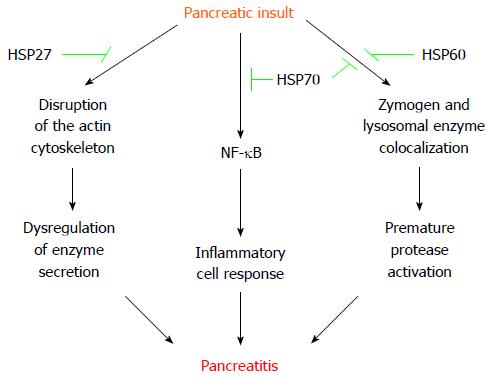Copyright
©2014 Baishideng Publishing Group Inc.
World J Gastroenterol. May 21, 2014; 20(19): 5801-5807
Published online May 21, 2014. doi: 10.3748/wjg.v20.i19.5801
Published online May 21, 2014. doi: 10.3748/wjg.v20.i19.5801
Figure 1 Hypothetical mechanisms underlying prior-acute-short-stress protects against pancreatitis.
Pancreatic insults may provoke dysregulation of enzyme secretion, premature protease activation and inflammatory acinar response, which result in the development of pancreatitis. Different stressors such as hyperthermia, hypothermia, hypoxia, energy depletion and chemicals, can induce pancreatic heat shock proteins (HSP) by a prior-acute-short-stress exposition. Distinct HSP avoid the disruption of the actin cytoskeleton, zymogen/lysosomal enzyme colocalization and activation of the pro-inflammatory nuclear factor-kappa beta (NF-κB) caused by the pancreatic insult. These HSP-mediated effects seem responsible for the protection against pancreatitis. The specific pathway inhibited by each HSP is depicted in green.
- Citation: Binker MG, Cosen-Binker LI. Acute pancreatitis: The stress factor. World J Gastroenterol 2014; 20(19): 5801-5807
- URL: https://www.wjgnet.com/1007-9327/full/v20/i19/5801.htm
- DOI: https://dx.doi.org/10.3748/wjg.v20.i19.5801









